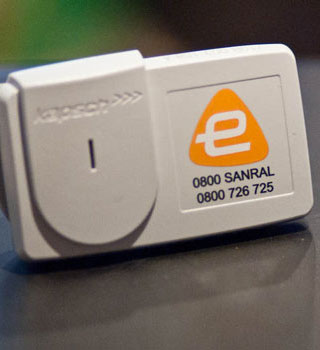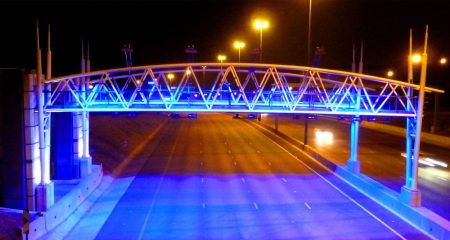 The national treasury has applied to intervene in the Gauteng e-toll case to be heard by the high court in Pretoria this week.
The national treasury has applied to intervene in the Gauteng e-toll case to be heard by the high court in Pretoria this week.
“There would be serious negative implications for future financing of roads and investment in public transport, were Sanral to be interdicted from implementing the toll collection system,” treasury said in a statement on Monday.
The treasury has applied for leave to intervene in the application to be heard by the court on Tuesday.
“National treasury will argue that the interdict should be denied and the implementation of toll collection should be permitted to proceed, as has been decided by cabinet and in keeping with the provisions of the Sanral Act.”
The application has been brought by the Opposition to Urban Tolling Alliance, the SA Vehicle Renting and Leasing Association, The Quadpara Association of SA and the SA National Consumer Union.
They want to stop the levying and collection of tolls on certain roads in the Gauteng from going ahead on 30 April.
The respondents in the case are Sanral, the minister of transport, the MEC of roads and transport, Gauteng, the minister of water and environmental affairs, the director-general of the department of water and environmental affairs, and the National Consumer Commission.
Treasury said the case was important because it affected the state’s ability to finance road infrastructure. It also had significant implications for the integrity and sustainability of the public finances, treasury said.
“Of concern also is the implication for Sanral’s capacity to repay its debt, which is partially guaranteed by government. The integrity and sustainability of government’s continued access to capital markets is a vital and essential determinant of SA’s capacity to finance the infrastructure required for economic growth, development and rising living standards,” the treasury said.
Government had contributed R5,75bn to the project so that user toll fees would be lower, treasury said.
Tolling of certain major arterial roads was necessary for economic growth and development.
“These routes are those which carry the heaviest traffic load in the country, and serve as critical economic corridors for both freight and personal travel purposes. In the case of the Gauteng freeway network, rising traffic volumes and the resulting congestion costs to users are a further argument for the recovery of costs through toll charges.”
Treasury said road users benefited through improved safety, lower travel time and lower operating costs.
“Based on the current toll proposals, which exempt taxi operators and other public transport services, higher income users will account for over 95 percent of toll revenue,” treasury said.
Meanwhile, the Democratic Alliance said on Monday that Sanral was misleading the public by displaying only one tariff on its sign boards at toll gantries.
“All three tariffs on all classes of vehicles should, and must, be displayed to the road user,” DA MPL Neil Campbell said in a statement. “I will be referring this failure … to the National Consumer Commission.”
The agency put up tariffs on toll boards last week. Campbell said the agency’s “incomplete disclosure”, by displaying only the discounted rate which applied to registered e-tag users, was a tactic to paint itself in the “best possible light”.
“The so-called ‘standard’ rate which one would assume to be the ‘normal’ rate has been totally ignored by Sanral, as has the ‘alternate’ rate which will be charged for non-registered users,” he said.
Sanral could not immediately be reached for comment.
The agency gazetted new tariffs recently and described an “alternate user” as someone “who does not have a valid and operational e-tag, is not registered with Sanral, and who is not a day-pass user”. Alternate users would be charged R1,75/km, compared to 30c/km for registered users.
Trade union federation Cosatu last week announced it was planning “the mother of all protests” against e-tolling this week. It encouraged its 2m members to join rallies, marches, demonstrations and night vigils across the country. — Sapa




